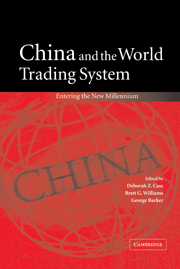Book contents
- Frontmatter
- Contents
- List of figures
- List of tables
- List of contributors
- Preface
- Acknowledgements
- Abbreviations and acronyms
- Introduction: China and the reshaping of the World Trade Organization
- PART I The world trading system
- PART II The accession
- PART III China – the domestic sphere
- PART IV Trade in goods
- PART V Trade in services and competition policy
- 13 WTO membership and professional services regulation in China
- 14 The impact of China's WTO accession upon regulation of the distribution and logistics industries in China
- 15 Regulating the new economy: implications of WTO accession for telecommunications and e-commerce in China
- 16 Segregation and convergence: the Chinese dilemma for financial services sectors
- 17 Adopting a competition law in China
- PART VI Intellectual property
- PART VII Dispute settlement
- Select bibliography
- Index
14 - The impact of China's WTO accession upon regulation of the distribution and logistics industries in China
Published online by Cambridge University Press: 28 July 2009
- Frontmatter
- Contents
- List of figures
- List of tables
- List of contributors
- Preface
- Acknowledgements
- Abbreviations and acronyms
- Introduction: China and the reshaping of the World Trade Organization
- PART I The world trading system
- PART II The accession
- PART III China – the domestic sphere
- PART IV Trade in goods
- PART V Trade in services and competition policy
- 13 WTO membership and professional services regulation in China
- 14 The impact of China's WTO accession upon regulation of the distribution and logistics industries in China
- 15 Regulating the new economy: implications of WTO accession for telecommunications and e-commerce in China
- 16 Segregation and convergence: the Chinese dilemma for financial services sectors
- 17 Adopting a competition law in China
- PART VI Intellectual property
- PART VII Dispute settlement
- Select bibliography
- Index
Summary
Introduction
From the perspective of a foreign company, the legal and logistical problems associated with distribution of products in the People's Republic of China is arguably the most difficult aspect of doing business in China. Since it embarked on its course of economic reforms and the opening of its economy to foreign investment in the late 1970s, the Chinese government has consistently pursued a policy preference for attracting foreign capital, manufacturing technology and management expertise while restricting the ability of foreign companies to import, distribute and sell their products. Despite this, foreign companies have been excited by the possibilities that have been offered by the gradual breakdown of China's command economy and socialist distribution network. However, the combination of diverse markets, poor infrastructure, local protectionism and corruption, together with the restrictions imposed by state laws and policies on the ability of a foreign company to sell and deliver its products to customers has often proved an overwhelming challenge for foreign investors and has retarded the development of an efficient and modern distribution system in China.
In the early to mid-1990s, foreign distribution and logistics companies began to establish themselves in China with a view to bringing western-style supply-chain management systems to what was, and continues to be perceived as, a market of immense opportunity.
- Type
- Chapter
- Information
- China and the World Trading SystemEntering the New Millennium, pp. 238 - 262Publisher: Cambridge University PressPrint publication year: 2003

